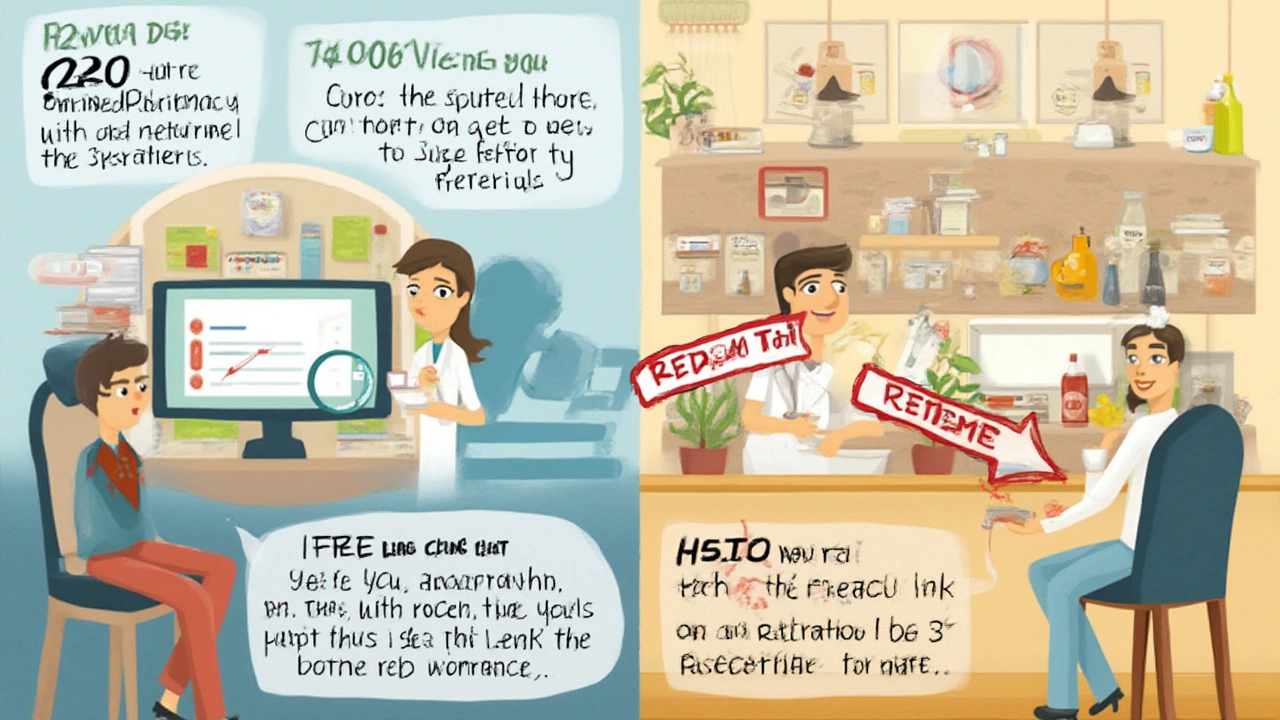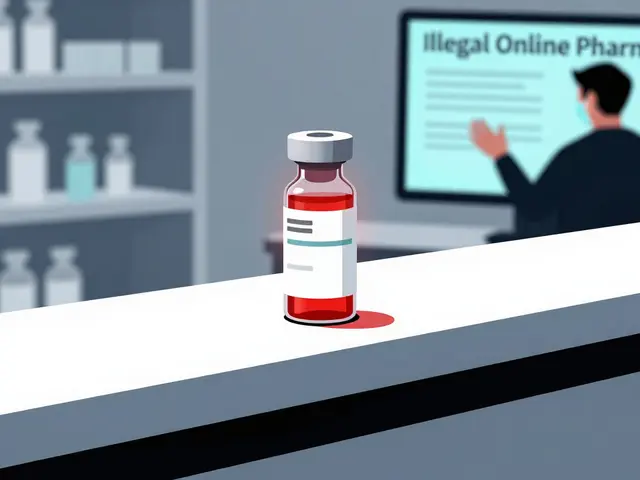Imagine you’re scrolling through your phone and you see people talking in some forum about buying penicillin online. Tempting, right? It sounds fast and easy, and who hasn’t wanted to skip a doctor’s waitlist? But is it really that simple? There are some things most people don’t realize about buying antibiotics like penicillin over the internet—some problems could get you in real trouble, and others could actually make you sick. So, let’s talk real facts—no sugarcoating—about how this actually works, where things go sideways fast, and how you can keep yourself safe if you’re convinced this is the only way.
Why Do People Try to Buy Penicillin Online?
It’s not just stubborn people avoiding the doctor. Sometimes it feels like there’s no other choice. Maybe your local GP has a three-week waitlist. Maybe you’re travelling and got a sudden infection. Maybe you had penicillin before and know what you need. In a 2022 UK health poll, 18% of respondents said they’d at least considered buying antibiotics online due to appointment delays or embarrassment about their symptoms. For some folks, it’s also about convenience—click, pay, done, pills shipped to your door.
The NHS is pretty clear about it: you should only take antibiotics if a healthcare professional says you need them. But life's a bit messier than official advice. Internet searches for “buy penicillin online UK” spike every winter—right along with cough, sinus, and throat infections. A lot of people ask if it’s actually legal or safe. The advice given across the web ranges from genuinely helpful to dangerously wrong. This section breaks down all the reasons you might be thinking about skipping straight to the source. The good, the bad, and the risky.
Penicillin is one of the oldest antibiotics, developed back in 1928 by Alexander Fleming in London. Ever since then, people have used it for all kinds of infections—from strep throat to skin wounds. These days, some folks can’t use it because they’re allergic, but for many, it’s the tried and true fix. Trouble is, you often can’t just pick it up at the pharmacy without a prescription from a GP or private doctor in the UK or Ireland. So, the internet starts to look like a shortcut. But, like most shortcuts, it’s full of potholes and dead ends.
Is It Legal to Buy Penicillin Online in the UK and Ireland?
This is where things really get interesting. A lot of the “buy antibiotics online” chatter makes it seem like it’s a total free-for-all. The truth? If you’re in the UK or Northern Ireland, penicillin is a prescription-only medication. The law is clear: no proper prescription, no legal antibiotics. Sites that promise to send you penicillin without a single question are almost always breaking UK drug laws. Even in 2025, there’s no new loophole. The threat of fines—or even prison—for selling antibiotics unlawfully is no joke.
Here’s something most people don’t realize: some legal online pharmacies will offer penicillin, but only after you complete a medical questionnaire or an online consultation with a real doctor. The site will check your details, maybe ask for ID, and then—if a UK-registered prescriber thinks it’s safe—they’ll send your prescription to a registered pharmacy for dispensing. That’s the only way to stay on the right side of the law. Sites that skip this part are the digital equivalent of a dodgy back-alley dealer.
Get this—according to the UK Medicines and Healthcare products Regulatory Agency (MHRA), they shut down over 9,600 illegal online pharmacies in 2023 alone, confiscating over £8 million worth of fake or unlicensed medicines. A chunk of those? Antibiotics like penicillin. Fake drugs can be worse than useless—they can be dangerous. So, if a website says “no prescription needed,” your scam alarm should start ringing. You’re not just breaking the law if you buy here—you’re risking your health.

How to Spot Safe and Trustworthy Online Pharmacies
Sorting the legit from the scammy isn’t rocket science, but it does take a bit of detective work. First, look for sites that are registered with the General Pharmaceutical Council (GPhC) if they’re UK-based. Every legal online pharmacy will display their registration number—usually in the footer. You can check that number on the GPhC website to make sure they’re really who they say. If you’re in Ireland, the Pharmaceutical Society of Ireland (PSI) is the regulator to check.
Next, any site that offers to sell you penicillin online will ask health questions. Expect to fill out a medical questionnaire or have a quick online chat with a qualified pharmacist or prescriber. No questions? No deal. Also—payment should be secure (look for HTTPS in the web address), and the site’s privacy info should be clear about how your data is handled.
Here’s a quick fact: the NHS released a report in 2024 stating that sites with NHS links, doctor info, or clear pharmacy addresses are 97% less likely to be scams than random ones. Don’t skip the reviews, either. Real reviewers talk about delivery speed, packaging, and if they had to upload a prescription. If every review sounds fake, they probably are. Another smart tip: look for online pharmacies endorsed by the British Healthcare Trades Association (BHTA)—they can’t just buy that badge, they have to prove they’re the real deal.
Some online pharmacies will send medication from overseas, even if the website looks UK-based. If you order penicillin from outside the UK or EU, it might be held by customs or destroyed. Worse, you might get a warning letter—or worse still, nothing at all and a lost payment. Stick to sites that show a real local address and clear pharmacy registration.
Risks of Buying Penicillin Online Illegally
This is the part most people think happens to “someone else”—but statistics say otherwise. In 2024, the World Health Organization (WHO) found that around 18% of antibiotics sold online without prescriptions were substandard or fake. Some had zero active ingredient; others contained harmful contaminants. With fake meds, you’re not just losing money—you could end up with kidney trouble, allergic reactions, or resistant infections that get way worse. There’s also the risk that you self-diagnose wrong. Maybe you think you have strep throat, but you actually have glandular fever, or worse. Taking penicillin then does nothing except add side effects.
If the idea of drug-resistant bacteria doesn’t scare you, it should. The more people take penicillin without medical oversight, the more we “teach” bacteria to shrug off the drug. In 2023, Public Health England recorded a 25% jump in antibiotic-resistant infections compared to 2020. This is why the NHS pushes so hard for prescriptions only. Each pack sold online illegally makes it a bit more likely that, next time you do get sick, there won’t be anything that works. And trust me, dealing with a resistant bug is no fun.
Here’s a table showing where fakes are most common, just to give you an idea of the scale:
| Region | Fakes Detected (%) |
|---|---|
| Asia | 23% |
| Eastern Europe | 19% |
| UK/Ireland | 9% |
| North America | 6% |
Those numbers have risen every year since 2020. If you value your health, resist the urge to gamble on those odds.

What You Should Do If You Need Penicillin Fast
Maybe you’re desperate—symptoms are flaring, your own GP can’t see you until next week, and you’re thinking, “Sod it. I’m ordering online anyway.” Before you cave, try these tips first:
- Contact your GP’s receptionist and explain your symptoms. In many areas, they can arrange emergency “triage calls” for suspected infections that need urgent antibiotics.
- Check for local private clinics—yes, you’ll need to pay, but many offer same or next-day appointments for urgent scripts.
- Use NHS-approved or PSI-approved online doctor services. These usually get you a real consultation by video or phone, with a prescription sent direct to a local or mail-order pharmacy. You’ll pay consultation fees (typically £25–£40), plus the cost of penicillin, but it’s fast and fully legal.
- If you’re travelling abroad, look for International Health Regulations (IHR) clinics. These are set up for expats and can prescribe legal antibiotics.
- Visit NHS walk-in centres or urgent care clinics—most keep extended opening hours, including weekends.
Still thinking about online options? Stick to NHS-linked or GPhC-registered digital clinics. They check symptoms, screen for allergies, and write safe, legal scripts. They might be a bit pricier than dodgy websites, but you avoid legal headaches and medical risks.
Shortcuts can be tempting—but this is one area where shortcuts can cut years off your life, not minutes off your schedule.







Barbara McClelland
July 23, 2025 AT 09:30So many people don’t realize how dangerous this is-antibiotics aren’t candy. I’ve seen friends self-medicate after a bad cold and end up in the ER with C. diff. Don’t risk it. There’s always a way to get help legally, even if it feels slow.
Alexander Levin
July 24, 2025 AT 09:39Pranab Daulagupu
July 25, 2025 AT 17:42From India, I’ve seen this firsthand-people order antibiotics from Telegram bots thinking they’re saving time. But the pills are often chalk dust or worse. One cousin took ‘penicillin’ and got liver damage. No joke. Consult a doc. Always.
Ady Young
July 26, 2025 AT 21:59I get why people do it. My mom had a UTI while traveling and couldn’t find a clinic for days. We ended up using a verified telehealth service-paid $35, got a script in 20 mins, filled it at CVS. Legal, fast, no drama. It’s not perfect, but it’s better than gambling with fake meds.
Travis Freeman
July 27, 2025 AT 09:32Big picture: every time someone takes a fake antibiotic, it’s not just their body at risk-it’s everyone’s. Superbugs don’t care about borders. We’re all connected in this mess. Choosing the slow, safe path isn’t weakness. It’s collective responsibility.
Sean Slevin
July 28, 2025 AT 00:06Chris Taylor
July 28, 2025 AT 13:35My cousin got penicillin from a ‘pharmacy’ in Mexico via Instagram. It worked... for like 3 days. Then she got a rash that looked like a spider bite. Turned out it was a reaction to the filler. Took 6 weeks to clear. Worth it? Nah.
Melissa Michaels
July 29, 2025 AT 09:19Matthew Stanford
July 29, 2025 AT 20:10Hey, I’m from the Midwest and I’ve been there. Waiting weeks for a GP when you’re sick sucks. But I learned the hard way: there’s a difference between ‘convenient’ and ‘safe’. I use a telehealth app now-$40, real doctor, real script. It’s not perfect but it’s honest.
Olivia Currie
July 30, 2025 AT 02:37OMG I JUST SAW A POST ON TIKTOK WHERE SOMEONE SAID THEY BOUGHT PENICILLIN FOR $8 AND IT ‘FIXED THEIR SINUS’-MY HEART STOPPED. PEOPLE. STOP. JUST. STOP.
Curtis Ryan
July 31, 2025 AT 20:56Rajiv Vyas
August 2, 2025 AT 01:50farhiya jama
August 3, 2025 AT 14:35Astro Service
August 3, 2025 AT 18:38DENIS GOLD
August 5, 2025 AT 16:48Ifeoma Ezeokoli
August 5, 2025 AT 19:21From Nigeria, I’ve seen families share one pill between three people because they can’t afford the clinic. It’s heartbreaking. The system fails people daily. But I still say-don’t gamble with antibiotics. There are NGOs that help. Reach out. You’re not alone.
Daniel Rod
August 6, 2025 AT 03:57It’s wild how we treat antibiotics like they’re just another Amazon purchase. But they’re not. They’re biological tools. Misuse changes the evolution of life itself. We’re playing god with bacteria-and losing. 🤖💀
gina rodriguez
August 6, 2025 AT 04:45I work in a pharmacy and I’ve seen people come in asking for penicillin without a script. We always say no. But I also try to help them find a low-cost clinic. It’s not about being rigid-it’s about being human.
Sue Barnes
August 7, 2025 AT 21:52jobin joshua
August 9, 2025 AT 01:38